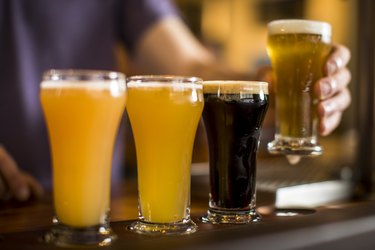
Bouts of recurring stomach pain lasting minutes to hours, between meals or at night, are telltale signs of a stomach ulcer, notes the National Institute of Diabetes and Digestive and Kidney Diseases (NIDDK). But what triggers it? And if you have an ulcer, is alcohol your friend or foe?
Understanding Ulcers
Video of the Day
Roughly four million Americans have peptic ulcer disease, the American Gastroenterological Association notes.
Video of the Day
Stomach ulcers, also known as peptic ulcers, are essentially open wounds or sores that take root along the inside lining of the stomach or the upper region of the small intestine, explains the Mayo Clinic. In most cases, they're the result of an infection from spiral-shaped bacteria called Helicobacter pylori (H. pylori).
Read more: Foods Not to Eat With Pylori Bacteria
With such infections, the bacteria end up damaging the mucous coating of the stomach lining, NIDDK says. This allows stomach acid to seep through, giving rise to an ulcer.
Still another possible driver is long-term use of popular non-steroidal anti-inflammatory medications (NSAIDs), such as aspirin or ibuprofen, either on their own or in conjunction with an H. pylori infection, NIDDK says.
But can drinking alcohol lead to an ulcer?
Alcohol and Peptic Ulcer Disease
When it comes to the impact of lifestyle choices on ulcer risk, the science has been murky. The British National Health Service (NHS), for one, notes that while it used to be thought that alcohol, certain foods or stress might increase ulcer risk, the evidence is spotty. NIDDK does not highlight any of those factors as drivers of risk, and the Mayo Clinic flat out dismisses the notion that either stress or spicy foods alone can lead to peptic ulcers.
It's true that a study published in the November 2017 issue of Clinical Endoscopy found that heavy drinking exacerbated ulcer symptoms in people with peptic ulcer disease, but the authors noted that more research is needed to tease out whether alcohol leads to peptic ulcer disease.
An investigation published in the March 2013 issue of Applied Psychology: Health and Well-Being also sheds some light on the alcohol link. The authors cautioned that for many, heavy drinking is essentially an attempt to self-medicate, possibly making alcohol consumption an in-direct marker for other environmental factors that might up ulcer risk, such as poor work conditions or a troubled family life.
The American Addiction Centers notes that some researchers go so far as to say that light to moderate drinking might actually lower ulcer risk, by blocking H. pylori from even getting to the stomach.
Avoid Alcohol if You Have an Ulcer
But regardless, what seems less controversial is that downing beer, wine or a Bloody Mary is certainly not going to do your ulcer any good once it has developed.
"Beer and other alcohol can aggravate ulcers," says Connie Diekman MEd, RD, a food and nutrition consultant in St. Louis, former director of university nutrition at Washington University St. Louis and former president of the Academy of Nutrition and Dietetics.
"Alcohol, like spicy foods, coffee, soft drinks and tomato-based dishes and juices can all irritate ulcers," she warns. "None of those foods cause ulcers. The bacteria H. pylori are the cause. But once the ulcer is there, these foods, especially in excess, can cause pain by aggravating the ulcer."
That thought is seconded by the American Academy of Family Physicians, which cautions people with ulcers to avoid alcohol. Similarly, the American Addiction Centers points out that drinking can exacerbate an ulcer, leading to internal bleeding, stomach hole formations and scarring.
According to the GI Society (the Canadian Society of Intestinal Research), alcohol drives up acid production, which deteriorates the gastrointestinal tract's protective mucous lining and increases inflammation and bleeding. The group advises pushing cocktails to the side altogether, or limiting drinking to "moderate" levels — meaning not more than two drinks a day for men and no more than one drink a day for women.
The GI Society also advises limiting your diet to foods that are high in fiber and rich in vegetables, fruits and whole grains to combat ulcer pain.
Read more: What Can I Eat and Drink with a Peptic Ulcer?
- Connie Diekman, MEd, RD, food and nutrition consultant, St. Louis, Missouri; former director, university nutrition, Washington University in St. Louis; former president, Academy of Nutrition and Dietetics; author, The Everything Mediterranean Diet Book
- National Institute of Diabetes and Digestive and Kidney Diseases: "Symptoms & Causes of Peptic Ulcers (Stomach Ulcers)"
- Mayo Clinic: "Peptic Ulcer"
- British National Health Service (NHS): "Causes: Stomach Ulcer"
- Clinical Endoscopy: "Risk Factors for the Presence of Symptoms in Peptic Ulcer Disease"
- Applied Psychology: Health and Well-Being: "Restoring Psychology's Role in Peptic Ulcer"
- American Academy of Family Physicians: "Ulcers"
- American Addiction Centers: "How Are Ulcers Formed From Drinking Alcohol?"
- GI Society (Canadian Society of Intestinal Research): "Stomach Ulcer Diet"
- American Gastroenterological Association: "Peptic Ulcer Disease"
Is this an emergency? If you are experiencing serious medical symptoms, please see the National Library of Medicine’s list of signs you need emergency medical attention or call 911.